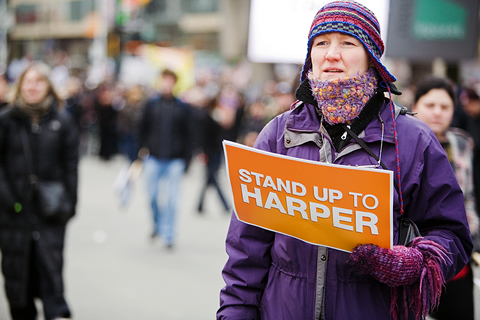Earlier this year, 22,000 people joined a Facebook group to protest a potential teachers’ strike at Ontario colleges. On a proposed “day of action” that called for students to leave their classrooms, however, no more than 20 students actually marched out (including one lone soul at Humber College). A Toronto Star reporter was among critics who termed this the latest example of “slacktivism,” a cynical term for the act of complaining online but doing little else.
Conversely, the anti-prorogue rallies held in cities across Canada were a remarkable success, drawing an estimated 5,000 in Toronto alone to protest Parliament’s shutdown, and garnering considerable attention. Sure, the majority of the 200,000 people who joined the Facebook group in support of Canadians Against Proroguing Parliament (CAPP) didn’t show, but the turnout was still enough to make the media tune in.
The difference between the two Internet-born actions appears to be the gap in the groups’ ability to make the jump from the web to the streets.
U of T student Walied Khogali, who helped co-ordinate the Toronto anti-prorogue event, says extensive postering and leafletting is what drew people to the protests. But he adds that Facebook certainly helped raise CAPP’s profile. “When [the number of members in] a Facebook group hits six figures, it has an impact. People ask ‘Why are so many joining this?’” Khogali compared the relationship between people who express their opinions through social media and those who actually take to the streets to “people who sign petitions and people who deliver those petitions.”
Mark Federmen, a PhD candidate at OISE who studies the effects of media in contemporary society, believes that Internet movements affect public opinion. “It’s demonstrable,” he says, pointing to Stephen Harper’s recent slide in the polls. The latest surveys show the Grits and the Tories in a dead heat for the third straight week.
But do politicians and policy-makers take Internet activism seriously? So far, there’s little evidence that an online petition or Facebook group has prompted a major change in policy. Barbara Mikkelson writes in an essay at Snopes.com that “those in a position to influence anything… accord e-petitions only slightly more respect than they would a blank sheet of paper.”
Gabe De Roche, who is the president of the U of T Young Liberals and currently works for a political consulting firm, says that translating Internet activism into a real-world movement is important for getting politicians to take notice. He argued the anti-prorogation movement wasn’t particularly meaningful for politicians until it went offline. “I tend to think of the Internet more as a tool than a political space − you can use it to access constituencies, but the end goal is to get them to a rally or a voting booth,” he says.
However, Internet activism is here to stay and both De Roche and Federman predict its influence will grow. Federman says older generations have a bias against “virtual reality,” while youth simply view it as reality. “For my daughter, all online interactions are real,” he says.






No Responses to “ On “Slacktive” Duty ”
I was at the Toronto CAPP protest and it was phenomenal. The organizers did a fantastic job, and that was the key - organization.
Both De Roche and Khogali are right on this one. Internet activism is just another tool in organizing and just another means to an end. To be successful, it needs to be connected to offline organizing, outreach and events.
The one example of a successful Internet campaign I can think of was when the Ontario Liberals were thinking of reforming youth driving regulations and there was a pretty massive backlash on Facebook. They scaled back their plans and then scrapped them entirely. While not very familiar with this campaign, I still doubt it happened only online.